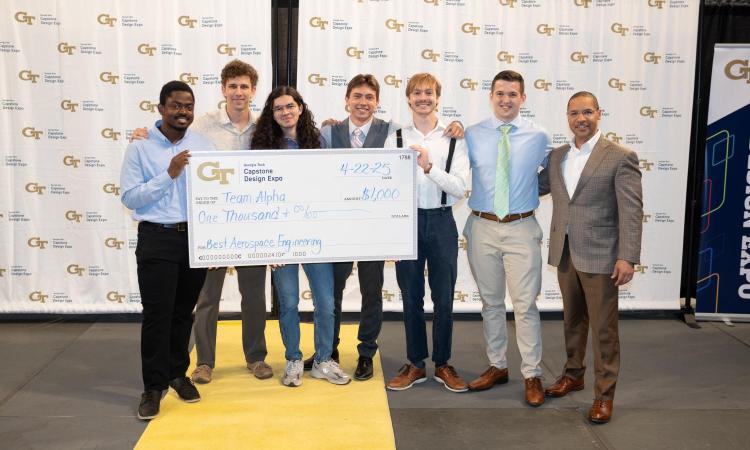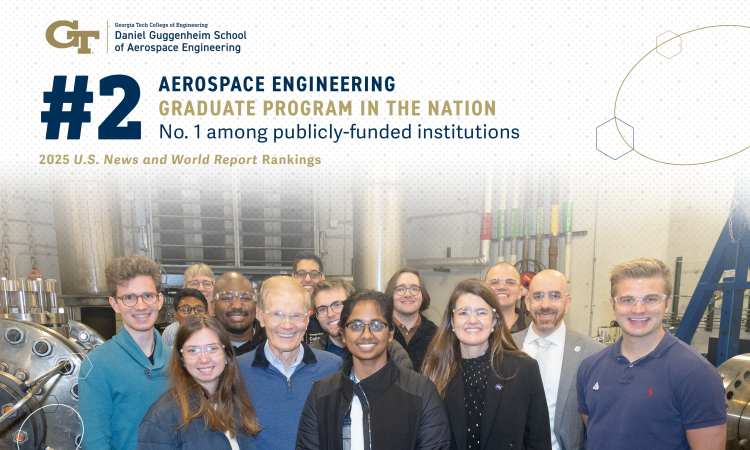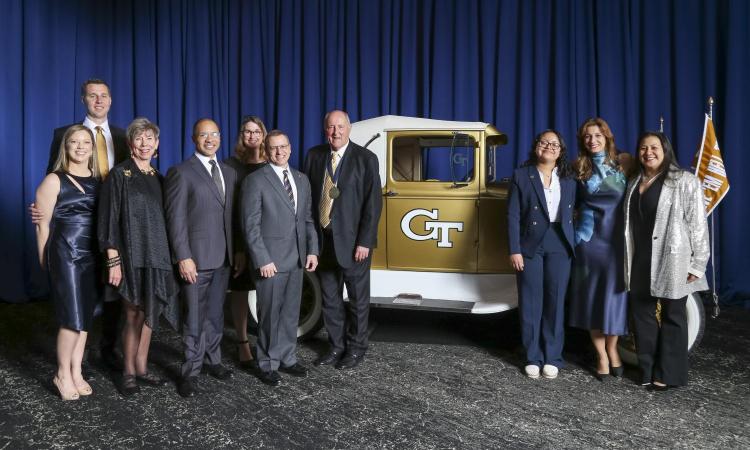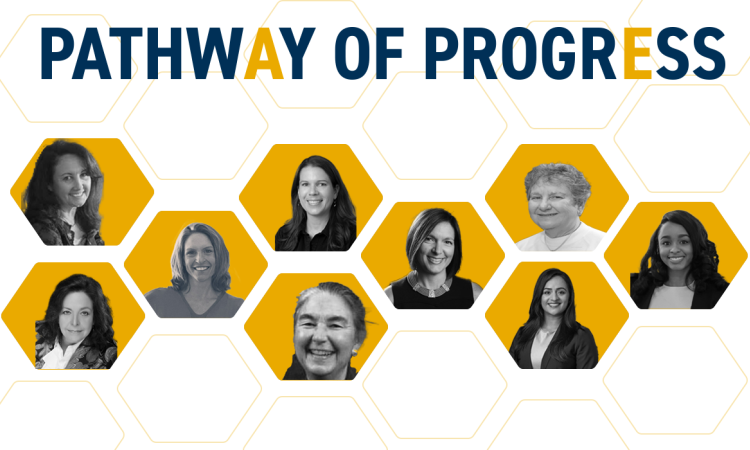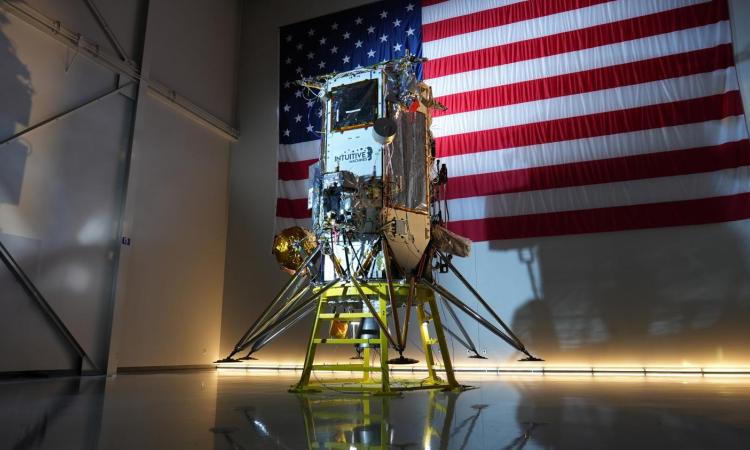News
Team Alpha Captures Top Aerospace Engineering Prize at Capstone Design Expo
The six-person team conceptualized a highly efficient aircraft for homeland defense.
AE Doctoral Student Lands Prestigious Space Policy Internship and Scholarship
Polina Verkhovodova selected into the inaugural class of Matthew Isakowitz Commercial Space Scholars.
Georgia Tech Researchers Pioneer Eco-Friendly Building Materials for Earth and Mars
A new study explores reconfigurable, sustainable construction materials that could transform how we build on this planet — and beyond.
AE School Remains No. 2 in 2025 Graduate Rankings
The U.S. News and World Report ranks the AE School as No. 1 among publicly-funded institutions.
AE Alumna Kathryn Engelhardt: Shattering Glass Ceilings with Intellect and Resilience
The AE pioneer reflects on the good times at Georgia Tech.
Outstanding AE Alumni Honored at College of Engineering Alumni Awards
Charles H. Gaylord, Jacob M. Kwasnik, and Gary Weissel were honored for their contributions to aerospace engineering.
Georgia Tech to Collaborate on $6.7 Million NASA University Leadership Initiative
Vamvoudakis and researchers will enhance Advanced Air Mobility safety.
Nine AE Alumnae Honored During the Pathway of Progress Grand Opening
Georgia Tech commemorates the achievements of its women with a new permanent art installation on campus.
Four AE Students Earn Patti Grace Smith Fellowships
Khalil Harruna, Lauren Leitch, Marquel Ollivierre, and Mersimoy Regassa are soaring to new heights this summer with exciting aerospace internships.
New Algorithms Developed at Georgia Tech are Lunar Bound
AE researchers have developed new algorithms to help Intuitive Machine’s lunar lander find water ice on the Moon.
Tim Lieuwen Named Georgia Tech’s Executive Vice President for Research
Following a nationwide search, Georgia Tech President Ángel Cabrera has named Timothy Lieuwen the Executive Vice President for Research (EVPR). Lieuwen has served as interim EVPR since September 10, 2024.
AE Professor Masatoshi Hirabayashi Studies Compelling Way to Deflect Asteroids From Earth
A Georgia Tech study analyzes NASA’s DART mission and proposes an innovative approach for kinetic deflection.
Turning to CubeSats in the Search for Life Thousands of Light-Years from Earth
Georgia Tech plays a starring role in NASA’s STARI mission to determine if telescope technology that studies exoplanets can be implemented in briefcase-sized spacecraft.
Two AE Students Named 2025 Brooke Owens Fellows
Catherine Fang and Andra Oltean will receive a paid summer internship, executive mentorship, and industry connections to leading aerospace organizations.
Aerospace Engineering Students and Alumna Named to Aviation Week Network’s 20 Twenties
Rising stars Lin Al Atik, Abraham Atte, and Manmeet “Shabri” Pelia accepted into the prestigious program’s 2025 class.
Yang Awarded with AIAA’s Highest Honor for Achievements in Aeronautics
Regents Professor Vigor Yang will receive the 2025 Reed Aeronautics Award for his substantial work in combustion research and education.
Professor Marilyn Smith Appointed David S. Lewis Professor
The professorship honors individuals with exceptional achievements in research, teaching, and service to aerospace engineering.
Griendling Inaugural Recipient of the C. Virgil Smith Faculty Teaching Award
Lecturer uses fail-fast philosophy to keep her courses engaging.
Vamvoudakis Named Editor-in-Chief of the Aerospace Science and Technology Journal
In this new role, he will oversee and direct the content of the widely acclaimed publication.
Georgia Tech CubeSat Propellant Innovation Set to Transform Space Missions
Engineers use heat as a propellant management device, expanding CubeSat mission's lifetime by 30%.
What's Next for the Class of 2024 as They Trek into the Future?
AE graduates tell us about their next adventure.
Team All Hands on Dec Takes Top Prize for Best Aerospace Project at the Capstone Design Expo
Students investigate the moon’s south pole to find water ice
ASDL Receives NASA Award to Study and Design Future Sustainable Aircraft
The Aerospace Systems Design Laboratory (ASDL) has received an award under the NASA Advanced Aircraft Concepts for Environmental Sustainability (AACES) 2050 contract.
Engineering the Origin of the Wheel
A multidisciplinary team of researchers used structural mechanics and computational design to understand how the wheel was invented.
Tim Lieuwen to Deliver AIAA Dryden Lectureship at the SciTech Forum
The interim executive vice president for Research will discuss what’s next for propulsion and clean energy systems.
Space Race: Georgia Tech’s Aspiring Astronauts
A community of dreamers share their stories about reaching for the stars.
AE Professor’s Research Aims to Improve Decision-Making in Artificial Intelligence
Professor Vamvoudakis is designing frameworks and algorithms to make autonomous systems safer and smarter.
Georgia Tech Researchers Achieve World-Record Resolution in Turbulence Simulations
From the water that comes out of the faucet to the chemical reactions in jet engines that propel planes, turbulence affects our everyday lives. Researchers at Georgia Tech are studying the complex physics of turbulence in simplified settings that could help us better understand nature and engineering.
Three AE Students Receive Prestigious AIAA Scholarships
The American Institute of Aeronautics and Astronautics (AIAA) awarded Alfonso Lagares De Toledo, Leslie Nava, and Lauren Paulson scholarships to continue their educational pursuits.
Two Georgia Tech Teams Win at the VFS Student Design Competition
Team AeroLay takes first place, and team Horus brings home second place.
AE School's Undergraduate Program Ranks No. 2 in the Nation
The 2025 Best Colleges rankings mark 10 consecutive years of AE being in the top 2.
AE Professors Koki Ho and Kai James Named Associate Fellows by AIAA
Ho and James were selected for excellence in aerospace in their specialty area.
Aerospace Engineering Student Receives $40,000 Quad Fellowship
Adhiraj Bhagat will use the award to further supersonic carbon-free fuels research
Tim Lieuwen Honored by Royal Academy of Engineering
The former interim chair for the AE School has been elected an International Fellow for his contributions to the aerospace and energy professions.
Clearing the Air: Georgia Tech Takes Leading Role in Scrubbing the Atmosphere
A community of multidisciplinary researchers at Georgia Tech has taken on the job of cleaning up the Earth’s carbon-riddled atmosphere through direct air capture (DAC).
Georgia Tech Breaks Ground on New Hangar
The new state-of-the-art facility will bolster research in advanced aviation technologies.
Christos Athanasiou Works to Reuse Materials on Our Planet — and Beyond
With an NSF CAREER Award, the AE researcher will apply mechanics expertise to reduce trash and improve recycling.
Exploring Alternative Fuels for a Cleaner Tomorrow
AE alumni awarded the prestigious George Westinghouse Silver Medal
Regents’ Professor Tim Lieuwen to Serve as Georgia Tech’s Interim EVPR
Timothy Lieuwen has been appointed interim executive vice president for Research (EVPR) by Georgia Tech President Ángel Cabrera, effective September 10.
The Ramblin’ Rocket Club Swarms the Desert for Annual Rocket Launch
The Georgia Tech rocketry team discusses lessons learned and ambitious plans for future launches.
AE STEP Camp Going Strong After 10 Years
Georgia high school students learn through hands-on engineering projects.
A Legacy of Lifting Others Up and Breaking Barriers Along the Way
The early years and determination of Professor Marilyn Smith.
Cristina Riso Delivers Keynote at Top Aeroelasticity and Structural Dynamics Conference
Riso outlined the promise and challenges of new lighter-weight and energy efficient aircraft designs.
Hirabayashi Chosen by NASA to Join European Space Agency’s Planetary Mission to Study Results of Asteroid Deflection
The AE professor is working with an international group of scientists who are focused on near-Earth asteroid science and planetary defense.
The AE School Leaps to No. 2 in the Nation for Graduate Aerospace Programs
The Daniel Guggenheim School remains No. 1 among publicly funded institutions.
Professor Glenn Lightsey Named John W. Young Endowed Chair
AE recognizes faculty for outstanding accomplishments in space exploration.
